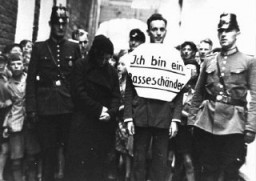You searched for: germany 1935
<< Previous | Displaying results 141-150 of 165 for "germany 1935" | Next >>
-
American Foreign and War Correspondents
ArticleLearn about US journalists, including Edward Murrow, William Shirer, and Dorothy Thompson, and their impact during the Nazi rise to power and WWII .
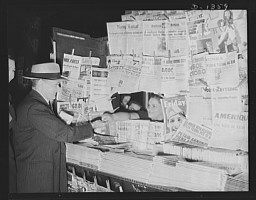
-
Dr. Johan Hendrik Weidner
ID CardJohan was the eldest of four children born to Dutch parents. His father was a minister in the Seventh-Day Adventist Church. Johan grew up in Collonges, France, where his father served as a pastor. After attending French public schools, Johan graduated from the Seventh-Day Adventist Seminary in Collonges, and went on to study law and business at the universities of Geneva and Paris. 1933-39: After completing his studies in 1935, Johan opened an import/export textile business in Paris. Business prospered…
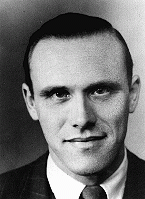
-
Inge Berg
ID CardInge lived with her parents, grandparents, uncle, and younger sister, Gisella, in Lechenich, a small village outside Cologne. The Bergs were an observant Jewish family. Inge's grandfather was the president of the local synagogue association and her uncle was the cantor. Her father, Josef was a respected cattle dealer, who had many business and personal contacts with their Jewish and non-Jewish neighbors. 1933–39: In 1935, two years after the Nazis came to power, Inge was forced to leave public school in…
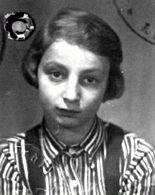
-
Helene Melanie Lebel
ID CardThe elder of two daughters born to a Jewish father and a Catholic mother, Helene was raised as a Catholic in Vienna. Her father died in action during World War I when Helene was just 5 years old, and her mother remarried when Helene was 15. Known affectionately as Helly, Helene loved to swim and go to the opera. After finishing her secondary education she entered law school. 1933-39: At 19 Helene first showed signs of mental illness. Her condition worsened during 1934, and by 1935 she had to give up her…
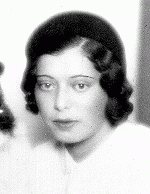
-
Arthur Menke
ID CardArthur was born to a Jewish family in Germany's largest port city, Hamburg. His father owned a small factory that manufactured rubber stamps. In the early 1930s, Hamburg was home to the fourth largest Jewish community in Germany, which had numerous social and cultural institutions. 1933-39: By 1935 conditions for Hamburg's Jews were bad. Arthur's family was moved to another part of town and in 1938, the Nazis seized his father's business. On national holidays many German citizens unfurled red, white and…
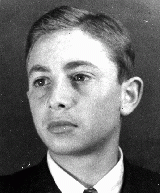
-
A chart detailing physical characteristics of a Romani (Gypsy) individual
DocumentA chart detailing physical characteristics of a Romani (Gypsy) individual, c. 1938. Dr. Robert Ritter and his team created extensive family trees and genealogical charts in order to identify, register, and classify all Romani people living in Nazi Germany. During the Nazi era, Dr. Robert Ritter was a leading authority on the racial classification of people pejoratively labeled “Zigeuner” (“Gypsies”). Ritter’s research was in a field called eugenics, or what the Nazis called “racial…
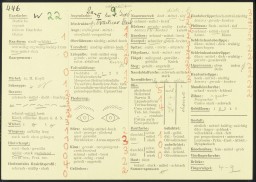
-
Edward Adler describes deportation to and arrival at the Sachsenhausen camp
Oral HistoryEdward was born to a Jewish family in Hamburg. In 1935, the Nuremberg Laws prohibited marriage or sexual relations between German non-Jews and Jews. Edward was then in his mid-twenties. Edward was arrested for dating a non-Jewish woman. Classified as a habitual offender, he was later deported to the Sachsenhausen concentration camp, near Berlin. He was forced to perform hard labor in construction projects. Edward had married shortly before his imprisonment, and his wife made arrangements for their…
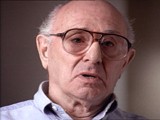
-
Edward Adler describes forced labor and conditions in the Sachsenhausen camp
Oral HistoryEdward was born to a Jewish family in Hamburg. In 1935, the Nuremberg Laws prohibited marriage or sexual relations between German non-Jews and Jews. Edward was then in his mid-twenties. Edward was arrested for dating a non-Jewish woman. Classified as a habitual offender, he was later deported to the Sachsenhausen concentration camp, near Berlin. He was forced to perform hard labor in construction projects. Edward had married shortly before his imprisonment, and his wife made arrangements for their…
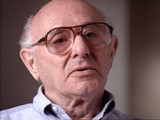
-
Protocols of the Elders of Zion: Key Dates
ArticleExplore a timeline of key events related to the Protocols of the Elders of Zion, the most notorious and widely distributed antisemitic publication of modern times.
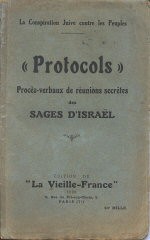
-
Defining the Enemy
ArticleNazi ideology aimed to promote the myth of an ideal national community and label those who were to be excluded from it as enemies. Propaganda was essential in promoting such myths.
